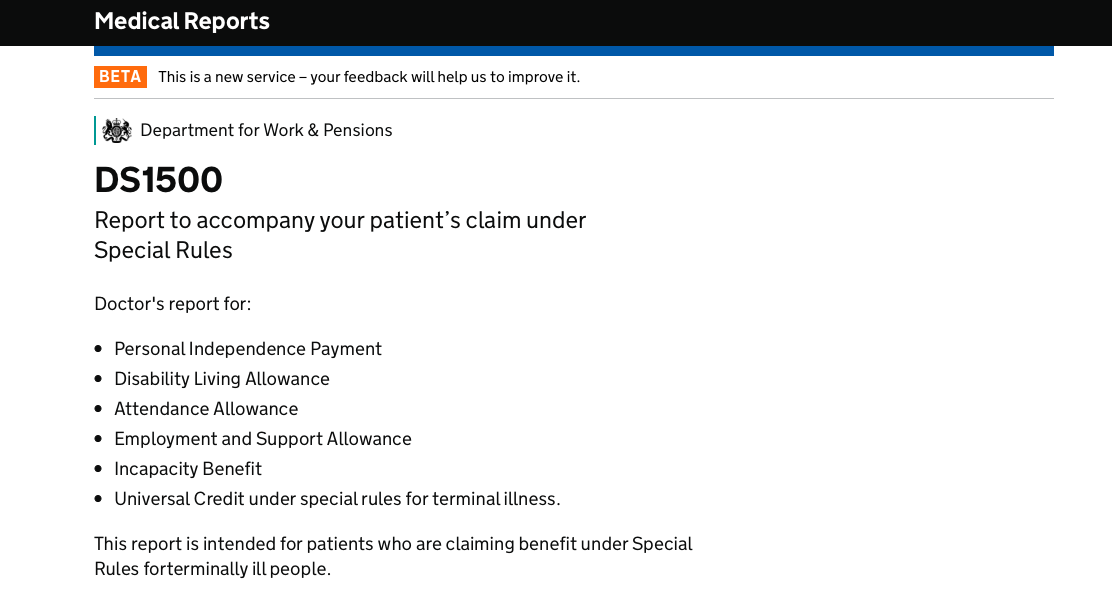
I’m Sophie Lambert and I’m the user researcher on the Secure Communications service. It’s my job to try to work out what we can do to make some of our most vulnerable users’ lives a little bit easier.
People who are aged between 16 and 64 and have less than 6 months to live can apply for Personal Independence Payment (PIP) under special rules. This means that the claim is treated as high priority, is processed without a face to face assessment, and the payments are made weekly. To do this they need to provide a DS1500 form, a report completed by a doctor or nurse containing medical information about their condition.
The process
Previously, a DS1500 form could only be sent to DWP via post and the average time for it to be received was 10 days. However, I learnt quickly that it can take much longer than this.
Now, our service allows healthcare professionals to submit a DS1500 form electronically which is received by DWP instantly and securely.
What can we do to help?
When somebody finds out they have less than 6 months to live, every moment counts. That’s why we’re reducing the amount of administration required and speeding up access to essential benefits.
Although our end user is the terminally ill patient, healthcare professionals are also a key user group for our service. We conducted user research with doctors and Macmillan nurses, visiting their hospitals and surgeries to understand how they work.
I gained insight into their working day and they helped us understand the complex lives of their patients and the expenses patients can face. This includes the cost of heating their home after the impact of chemotherapy. The DS1500 enables patients to get access to motability schemes and blue badges, which makes it clear how valuable our service could be.

Our service is in private beta which means we are testing it with a small number of healthcare professionals. We’re continuing to introduce our service to more doctors and Macmillan nurses, getting feedback and asking them to use the service for real patients. So far, we’ve received the digital DS1500 forms in a matter of seconds, not days or weeks, meaning the claim can be processed more efficiently.
Our service is about helping people in their final months, when time is precious. As a user researcher, seeing work being done to improve the lives of some our most vulnerable customers is incredibly rewarding.

6 comments
Comment by Ziv Lazar posted on
Intersting study. Just some thoughts on the matter. The list of services / benefits that one has to be aware of is staggering. Could these not be simplified / combined from the outset? Additionally, terminally ill people must have a host of other things to take care of: creating a will, funeral arrangements, etc. I am wondering if these were taken into consideration as well.
Comment by Sophie Lambert posted on
Hi Ziv, thanks for your comments. As you have pointed out, receiving the DS1500 is just one part of the user’s journey. Research has been conducted to help our understanding of the various facets of the user’s experience during this difficult time. Here at DWP I work alongside a team of user researchers working on different projects and together we’re collaborating to try to improve the user's experience throughout their journey.
Comment by Stirlee Legrand posted on
Sophie this is great for vulnerable customers. In the London Borough of Camden we have been processing travel concession applications such as Blue Badges, Freedom Passes and Taxicards within 24 - 48 hours for holders of DS1500 forms combining automatic checks of residency in the borough, using existing systems held within the Councils to auto verify their residency.
Comment by Sophie Lambert posted on
Hi Stirlee. Thanks for getting in touch. Through our research we’ve learnt how the DS1500 can impact access to a number of other service, such as those you have mentioned. It’s good to see other work being done around this to improve the journey for vulnerable customers.
Comment by Tracy Stephens posted on
I have been asked by one of our GP's to look in to this service becoming available. Can you tell me when this is due to be rolled out to practices?
Comment by Mark Bailey posted on
HI Tracy.
The beta version of the service is now available for health care professionals across all of NHS England and can be accessed via the NHS Spine Portal where there is a link to the service. We’ve recently blogged about it:
https://dwpdigital.blog.gov.uk/2017/10/03/how-cross-government-collaboration-shaped-the-report-that-your-patient-is-terminally-ill-service/